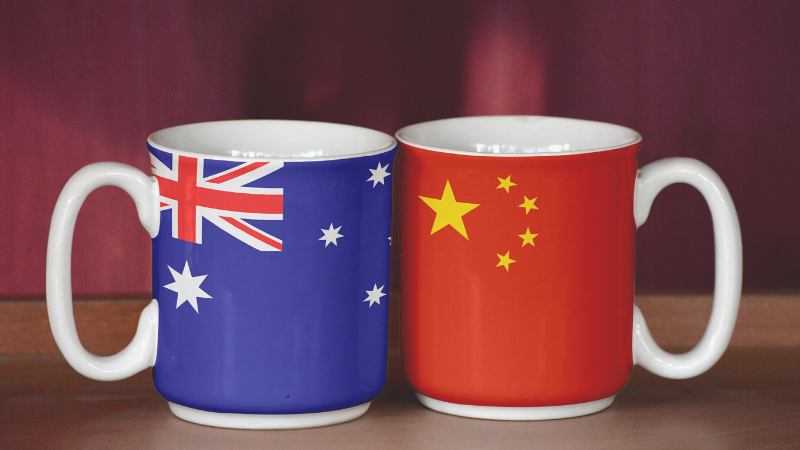Perspectives | The securitisation of ‘Chinese influence’ in Australia
April 14 2022

Perspectives is UTS:ACRI's commentary series, featuring a piece on a topical subject in the Australia-China relationship from an invited expert contributor.
By Andrew Chubb
Since 2017, Australia has often been held up as an exemplar for other high-income liberal democracies for its responses to the People’s Republic of China’s (PRC) political interference. Yet for many within Australia, the aggregated way in which a complex array of issues were presented to the public—often under the label ‘Chinese influence’—was dangerous and divisive.
In a new paper published in the Journal of Contemporary China I delved into the story of how ‘Chinese influence’ came to be understood as an existential threat to Australia, enabling a controversial expansion in the legal definition of national security, and placing Chinese-Australians under a racialised political microscope.
I found a couple of theories useful for understanding what has occurred in Australia. One is ‘securitisation’. Rather than assuming a direct correlation between threats and threat perceptions, international relations scholars Barry Buzan, Ole Waever and Jaap de Wilde argued it can be equally or more productive for analysts to focus on the social processes by which existential threats come to be defined. In their framework, there are three general conditions needed for this process of ‘securitisation’ to be successful. These involve the appropriate use of the language of security in a given area, leveraging of authority, and resonance with audience preconceptions.
Next is theories of public policy change, which can help to shed light on timing. In political scientist John W. Kingdon’s 1984 classic, Agendas, Alternatives and Public Policies, he emphasises that change is only likely where three ‘streams’ of effort come together: problems, policies and politics. Due to the very limited time of political decision-makers relative to the maelstrom of issues competing for attention, these streams usually remain separate on any given issue. Thus, it falls to ‘policy entrepreneurs’ to create and seize fleeting windows of opportunity to bring together the three streams of activity.
These theories illuminate the Australian experience.
In addition to traditional espionage, the concern of the Australian Security Intelligence Agency (ASIO) with ‘foreign interference’ stretches back decades. This is not widely understood. The 1979 ASIO Act empowered the agency to investigate a broad category of ‘active measures of foreign intervention’ to promote the interests of foreign powers. In 1986 this was revised to ‘foreign interference’, referring to clandestine or deceptive acts by or on behalf of foreign states that were either for intelligence purposes, detrimental to Australia or ‘for the purpose of affecting political or governmental processes’, as well as coercion on behalf of a foreign state, whether secret or overt.
From 2006 the assessments found in ASIO’s annual report to parliament on both the level and nature of the threat from foreign interference began to escalate. By 2011-2014, it was described as ‘pervasive’ and ‘worse than previously thought.’
In 2016, the assessment was upgraded further to ‘extensive, unrelenting and increasingly sophisticated.’ More significant, however, was ASIO’s linkage of the foreign interference threat to ‘sovereignty’ much more strongly from 2017, when various activities were described directly as ‘a threat to our sovereignty, the integrity of our national institutions and the exercise of our citizens’ rights.’
Recall the first condition in Buzan, Waever and de Wilde’s ‘securitisation’ framework. By using the language of sovereignty, the agency made foreign interference a matter of existential threat in the political sector. This move enabled the agency to successfully enlist political leaders and the media into an advocacy coalition capable of overturning the prevailing policy stasis.
Security officials possessed sufficient authority (the second condition in Buzan, Waever and de Wilde’s threat framework) to persuade key politicians to enact legislation, and prominent journalists to relay their threat assessments to the public. Malcolm Turnbull, for example, wrote in his memoirs of the impact of 2015 briefings on foreign interference from ‘the tall, austere director general of ASIO, Duncan Lewis.’ According to Turnbull, it soon became ‘obvious that Australian governments had simply not been paying attention’ to issues of espionage, foreign donations and transparency in lobbying.
ASIO officials also repeatedly briefed prominent journalists about their concerns. In turn, the media brought a credibility of their own to the advocacy coalition, though with less precision about the nature of the threat. The June 5 2017 episode of the Australian Broadcasting Corporation’s flagship investigative program, Four Corners, was a prime example, depicting a systematic campaign involving not only PRC state agents, but also pro-Beijing community organisations, businesspeople and students working systematically to subvert Australia’s sovereignty and political system. An accompanying Fairfax Media special feature covering an even wider array of issues was titled ‘China’s Operation Australia’, hammering home the idea of coordinated subversion.
Transmitted to the public in this manner, the idea of an existential threat from the PRC resonated with both vestigial fears of communist infiltration in the political sector, and identity-based ethno-nationalist fears of being ‘swamped’ by more populous Asian others. These audience preconceptions correspond with the third condition in Buzan, Waever and de Wilde’s recipe for successful securitisation.
The threat thus overflowed from PRC government interference in the political sector into a composite societal threat from ‘Chinese influence’, most prominently expressed in Clive Hamilton’s polemic, Silent Invasion (2018).
The discourse of ‘Chinese influence’ soon fed back into politics. In December 2017, Turnbull referenced ‘disturbing reports about Chinese influence’ in explaining a radical shakeup of Australia’s national security laws. Introducing the laws amidst the high-stakes Bennelong by-election campaign, Turnbull presented the threat as stretching from the political sector (sovereignty) into the societal sector (identity) by describing the referent object of protection to include both ‘our democracy’ and ‘our way of life’.
Another policy entrepreneur was former Special Air Service (SAS) captain and now parliamentarian, Andrew Hastie. Endorsing US ethno-nationalist Steve Bannon’s 2018 call for a ‘fight for the ages’ against PRC control, Hastie took the opportunity to locate the existential threat among the mainland Chinese population at large: ‘We are dealing with a state that uses the whole of society to advance its national objectives.’
The labelling of PRC interference as ‘Chinese influence’ projects a dangerous and unwarranted association between Chinese ethnicity and the Communist Party of China’s (CPC) political activities—one that reinforces the party-state’s fanciful claims on the loyalties of ethnic Chinese. Even if securitising policy entrepreneurs themselves are attuned to such nuances, their audiences—including politicians and the general public—often are not. Surveys of Chinese-Australians in 2020 and 2021 found nearly 20 percent reported being ‘physically threatened or attacked’ over their background in the preceding 12 months.
Unfortunately, as I show in the journal article, Australia has indeed led the English-speaking world into defining the problems raised by PRC overseas interference as ‘Chinese influence’.
With similar trends toward securitisation now apparent in other liberal democracies, a key question is whether appropriate policy measures to ensure democratic institutions’ resilience to PRC overseas political activities can be implemented while de-securitising ‘Chinese influence’.
Related works: A new policy report by the author, Rights Protection: How the UK Should Respond to China’s Overseas Influence, published by King’s College London on April 13, is available.
Andrew Chubb is British Academy Postdoctoral Fellow at Lancaster University, researching China's foreign relations. He is the author of PRC Overseas Political Activities: Risk, Reaction and the Case of Australia, published in September 2021 by Routledge and the Royal United Services Institute.

